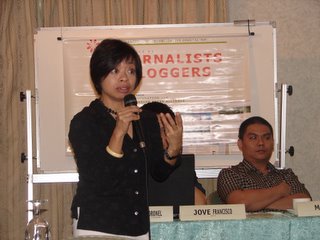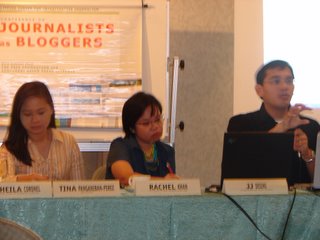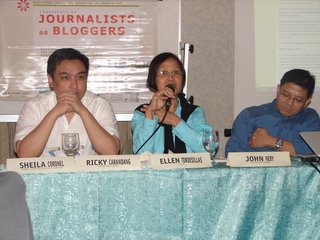It seems that the Gloriagate crisis is far from over. Bigfoot -- er, I mean,
Virgilio Garcillano is back in town, but his two appearances before the
House of Representatives committees investigating the controversy resulted in anywhere except putting the issue to an end.
And now, coup rumors are again in rife in the country's capital. With today's arrest of former defense secretary
Ret. Gen. Fortunato Abat who yesterday called for a revolutionary transition government, I wonder how our December would be.
What a year of political scandals, this 2005.
This year also marks significant changes on other fronts, including on the media. In an article published in the November issue of the
PJR Reports (formerly the
Philippine Journalism Review), I wrote how this year would be known as "
The Year of Filipino Blogs," with blog sites complementing (sometimes even scooping up) traditional news media in reporting news and information to the public
Year of Pinoy blogsBy Hector Bryant L. Macale
Thanks to the “Hello, Garci” tape scandal, journalists joining the community of Filipino bloggers have been increasing. And so are the questions about this latest powerful medium for free expression.
In a conference organized by the
Philippine Center for Investigative Journalism (PCIJ) last October 22, at least 50 journalists discussed the potentials and pitfalls of blogging. The forum, also supported by
The Asia Foundation and the regional press freedom alliance
Southeast Asian Press Alliance (SEAPA), looked into the legal issues and the opportunities for the press because of blogging.

"The beauty of blogging is you can do a blow-by-blow account," PCIJ executive director
Sheila Coronel said at the start of the conference.
Coronel’s assessment was based on the PCIJ’s recent experience with its institutional blog, “
Inside PCIJ,” which played a big role in the unraveling of the “Hello, Garci” scandal. “Inside PCIJ” provided in-depth reports and up-to-date account of events, sometimes ahead of most media outfits. It was the first to post online audio files and transcripts of the alleged conversations between
President Gloria Macapagal-Arroyo and former elections commissioner Virgilio Garcillano. The PCIJ blog registered almost 500,000 unique hits in June, when it started the daily coverage of the “Hello, Garci” scandal.
Instant feedback
Alecks P. Pabico, PCIJ online manager, called 2005 as "the year of Filipino blogs" because of the rapid increase of journalists and non-journalists who went into blogging following the political crisis. These blogs posted a wide range of topics from personal accounts and views to institutional concerns (such as “Inside PCIJ” and the
Center for Media Freedom and Responsibility’s “
Freedom Watch”) to experiments in citizen journalism (
Sun.Star’s “
Citizen Watch”).
According to
Max Limpag, who is in charge of the Sun.Star Cebu website, the blog is easier to manage than the website. Citing the experience of SunStar Cebu’s “Arroyo Watch” blog at the height of the “Hello, Garci” scandal, Limpag said feedback from readers were immediate.
With the success of the “Arroyo Watch,” Sun.Star created the “Citizen Journalism” blog which encouraged readers to post articles rather than not just send comments.
During the forum, ABC-5 reporter
Jove Francisco said he was attracted to blogging because it “offers something that is not available in the industry.” A Malacañang reporter, Francisco’s “By Jove!” blog regularly posts additional information or details about news in the Palace. “We want to say more of what we know,” he said.
Lawyer-blogger
JJ Disini, director of the University of the Philippines Law Internet and Society program, explained how laws on libel, sedition, privacy, and copyright could be applied to blogging.
When copying information or work from other online sites, he said "the less you use (the article) the better off you are." He stressed that using information from other sources is permissible for as long as the source is cited or a source link is provided in the post.
Blogging ethicsFor her part,
Rachel Khan, a UP journalism professor and deputy director of the Center for Media Freedom and Responsibility (CMFR), reminded bloggers that they are still accountable to the public. She said blog sites become popular only when readers know they can be trusted. Other reasons for a blog’s acceptance are the blogger’s level of niche expertise on a subject or particular field; transparency of motives (or biases); transparency in process (identification of sources); and willingness to take responsibility when mistakes occur.

Khan (shown in the middle with Tina Panganiban Perez on her left and Atty. Disini on her right) advised journalist-bloggers to strictly follow the Bloggers’ Code of Ethics by the CyberJournalist.net, a modification of the code of ethics by the US-based
Society of Professional Journalists.
But, this early, the Bloggers’ Code of Ethics does not seem good enough for some entities. GMA-7 reporter
Tina Panganiban-Perez said there are certain corporate or company guidelines which she and her co-employees must comply with in maintaining their blogs.
According to Perez, the GMA network staff are not allowed to discuss their work in their blogs. She said articles posted in the blog of veteran reporter Howie Severino is edited by GMA. The network hosts Severino’s blog,
Sidetrip.
Reacting to Panganiban’s revelations, Francisco and ANC anchor and blogger
Ricky Carandang heaved a sigh of relief that their networks have not come up with a similar policy on blogging.
Carandang observed that the impact of blogging on the mainstream press is not that yet significant. "While it’s gaining recognition, it’s not quite there yet," he said.

The
Philippine Daily Inquirer’s
John Nery agreed with Carandang, at the same time noting that blogs could be used to monitor radio reports. He said many radio reports are not picked up or pursued by other media.
Although she has yet to start her own blog,
Malaya columnist Ellen Tordesillas has reaped the benefits of blogging. She said blogs have proved to be valuable information sources for her reports. (Just an update: In less than a month after the PCIJ conference, Tita Ellen started her own
blog.)
The conference ended with a lively discussion on journalism standards as applied to blogging and a technical session on how to set up a blog.
If there was one thing that clearly stood out from the one-day discussions, it was, blogging is here to stay.

 By the way, would Mona Lisa still smile when she sees what she would look like after a week's travel to the United States? Got this from an Italian site. Whoa.
By the way, would Mona Lisa still smile when she sees what she would look like after a week's travel to the United States? Got this from an Italian site. Whoa.









